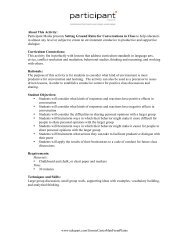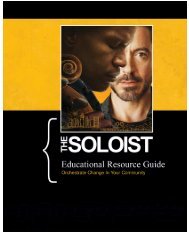THE KITE RUNNER COMPANION CURRICULUM - TakePart
THE KITE RUNNER COMPANION CURRICULUM - TakePart
THE KITE RUNNER COMPANION CURRICULUM - TakePart
Create successful ePaper yourself
Turn your PDF publications into a flip-book with our unique Google optimized e-Paper software.
HANDOUT 3.1<br />
CHALLENGES FACING HUMAN RIGHTS IN AFGHANISTAN<br />
POLITICAL CHALLENGES FACING HUMAN RIGHTS IN TODAY’S AFGHANISTAN<br />
1. To strengthen the central government<br />
As we learned in ACTIVITY 3 of LESSON 1, what has arisen in Afghanistan and what<br />
continues up until today is a system called ‘regionalism’. Regionalism is a system<br />
whereby there are mini-states within one nation state. Each mini-state is governed<br />
by local leaders who are supposed to report to the central government. Because<br />
Afghanistan has not had a strong central leadership, the communication between<br />
the government and the local leaders has diminished. The government therefore<br />
has not been able to deliver adequate social or public services to the regions.<br />
Instead, it is local regional leaders that deliver these goods and that maintain<br />
a greater control over the reasons. This presents serious human rights issues.<br />
Discuss with your group what human rights issues these could be. Present these to<br />
your classmates<br />
2. To exercise governmental control over the warlords and fundamentalists<br />
Because there has not been adequate control of regions/mini-states, or an<br />
adequate supply of goods and services to these regions, there has been a rise<br />
of local warlords in Afghanistan. Warlords ‘emerge from a direct response to the<br />
absence of law.’ In Afghanistan, warlords have been able to gain the ‘respect’ of the<br />
public by stepping in where the government failed to do so. For a while, the warlords<br />
were inactive. However, post 9/11, there has been a resurgence of warlordism in<br />
the provinces. There has also been a rise of fundamentalism in Afghanistan. Once<br />
specific fundamentalist group is the Taliban. The Taliban was able to seize power as<br />
most of the Taliban militia was trained as “freedom fighters” by the West in the war<br />
against Communism and the USSR. Over the years from 1979-1989 the Taliban<br />
militia was able to grow incredibly strong and by the 1990’s able to impose their<br />
brutally oppressive form of Islamic law which is by no means consistent with<br />
popular Afghan culture. The Taliban banned music, movies, TV, card playing, singing,<br />
dancing, boxing, kite flying and much more. Discuss with your group, what human<br />
rights issues warlords and fundamentalists bring about. Present these to your<br />
classmates<br />
3. To provide security and rule of law beyond Kabul<br />
In the recent past, the U.S., U.N. and other key players in Afghanistan have<br />
focused most of their security efforts on Kabul. In order for a solid system of<br />
stability to develop in Afghanistan, there has to be a serious commitment from the<br />
international community to giving as much attention to the provinces as it has given<br />
to Kabul. If not, regionalism will thrive. Discuss with your group, what the human<br />
rights concerns would be if security and rule of law is not extended beyond Kabul.<br />
Present these to your classmates.<br />
4. Economic Reconstruction<br />
Afghanistan remains extremely poor, landlocked, and highly dependent on foreign<br />
aid, farming, and trade with neighboring countries. It will likely take many decades<br />
30<br />
LESSON 3









